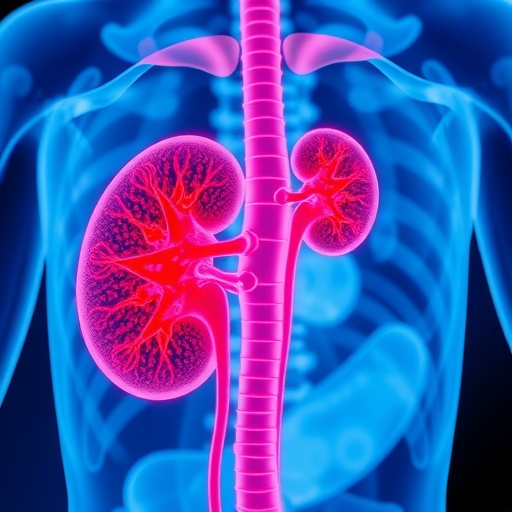Recent developments in the treatment of kidney transplant recipients suffering from Familial Mediterranean Fever (FMF) and associated amyloidosis have brought the spotlight onto the use of anti-interleukin-1 (anti-IL-1) agents. These medications have emerged as a potential game-changer in managing the complex interplay of inflammation and organ transplantation. The implications of these findings resonate deeply within the realms of nephrology and immunology, indicating a substantial shift in how we understand and treat inflammatory diseases related to kidney health.
As researchers and clinicians grapple with the intricacies of FMF and amyloidosis, the role of anti-IL-1 agents has garnered significant attention. Familial Mediterranean Fever, a hereditary autoinflammatory disorder, often leads to persistent inflammation and, ultimately, the deposition of amyloid in vital organs such as the kidneys. This can have detrimental effects on kidney function, necessitating transplantation as not only a lifesaving procedure but also a challenge against the backdrop of underlying conditions like FMF and amyloidosis.
Understanding how interleukin-1 (IL-1) drives the inflammatory responses in FMF has opened new therapeutic avenues. IL-1 is a pro-inflammatory cytokine implicated in various autoimmune conditions. Targeting IL-1 with specific agents could mitigate the inflammatory processes that complicate kidney transplants in individuals suffering from FMF. By reducing the systemic inflammation, we may enhance transplant outcomes, ultimately leading to improved patient quality of life and longevity.
The excitement surrounding anti-IL-1 agents is not unfounded. Clinical trials have demonstrated their efficacy in reducing the frequency and severity of FMF attacks. Additionally, these agents have been shown to lower amyloid deposits in affected tissues. This dual action—taming the inflammatory response while also impacting amyloid formation—makes anti-IL-1 therapy a promising candidate for managing kidney transplant recipients with a history of FMF and secondary amyloidosis.
The incorporation of anti-IL-1 agents into the existing treatment protocols poses several questions about their long-term impacts on kidney function post-transplantation. Early indications suggest that these therapies may enhance renal outcomes, potentially leading to greater graft survival rates. The pharmacological landscape is evolving, and as new evidence emerges, it substantiates the call for a reevaluation of our current treatment paradigms in nephrology.
One critical aspect of using anti-IL-1 agents is understanding their safety profile, particularly in transplant recipients. New therapeutic interventions must balance efficacy with potential adverse effects, as immunosuppression is a concern in transplant medicine. Trials have indicated that while these agents are generally well-tolerated, their use must be judicious, especially considering the heightened risk of infections associated with any immunomodulatory treatment.
Moreover, researchers are now exploring the optimal timing for initiating anti-IL-1 therapy in kidney transplant candidates with FMF. The ideal scenario may involve beginning treatment preemptively before the transplant is performed. By addressing the underlying inflammatory dysregulation early, it may be feasible to reduce the risk of transplant rejection and enhance graft function immediately post-surgery.
The translational aspect of research into anti-IL-1 therapy is impactful as it bridges the gap between laboratory findings and clinical application. Medical professionals are increasingly acknowledging the need for collaborative research efforts that bring together immunologists, nephrologists, and transplant surgeons. This multidisciplinary approach is crucial for unraveling the complexities surrounding FMF and its implications for kidney transplants.
Delving into the molecular mechanisms, the inhibition of IL-1 leads to a cascade of downstream effects that can stabilize immune function. Learning how these agents interact with the immune system can pave the way for more targeted therapies that not only alleviate symptoms but also prevent complications associated with chronic inflammation in transplant patients.
In the broader context, the implications of using anti-IL-1 agents extend beyond FMF and amyloidosis. The insights garnered from these treatments can inform strategies for other inflammatory conditions that affect organ transplantation. For instance, conditions like lupus nephritis and rheumatoid arthritis may also benefit from similar approaches.
Looking ahead, the landscape is being shaped by ongoing clinical trials and emerging data. Researchers are optimistic that future studies will refine our understanding of the optimal dosing and administration routes for anti-IL-1 agents in this unique patient population. The quest for personalized medicine in nephrology is not only beneficial for patients but is also essential in understanding the complex immunologic interactions at play.
Ultimately, the use of anti-IL-1 agents in kidney transplant recipients represents a marriage between innovative pharmacotherapy and the urgent need for effective management strategies in patients with inflammatory disorders. As the research community continues to unravel the multifaceted nature of FMF, the future of transplantation medicine may very well hinge on our ability to harness these new therapeutic tools.
In conclusion, the landscape of kidney transplantation for patients with familial Mediterranean fever and amyloidosis is undergoing a transformation, driven by the exploration and implementation of anti-IL-1 agents. These therapies hold the potential to shift the paradigm in managing renal complications associated with inflammatory conditions, paving the way for improved patient outcomes and enriched quality of life.
Subject of Research: The use of Anti-Interleukin-1 Agents in Kidney Transplant Recipients with Familial Mediterranean Fever and Amyloidosis.
Article Title: Use of Anti-Interleukin-1 Agents in Kidney Transplant Recipients with Familial Mediterranean Fever and Amyloidosis: What have been Learned so Far?
Article References:
Afsar, B., Afsar, R.E., Caliskan, Y. et al. Use of Anti-Interleukin-1 Agents in Kidney Transplant Recipients with Familial Mediterranean Fever and Amyloidosis: What have been Learned so Far?.
Curr Transpl Rep 12, 4 (2025). https://doi.org/10.1007/s40472-025-00461-z
Image Credits: AI Generated
DOI: 10.1007/s40472-025-00461-z
Keywords: Anti-IL-1 agents, Familial Mediterranean Fever, amyloidosis, kidney transplantation, immunology, inflammation, cytokines, renal outcomes.




